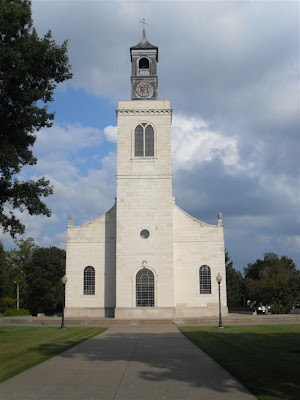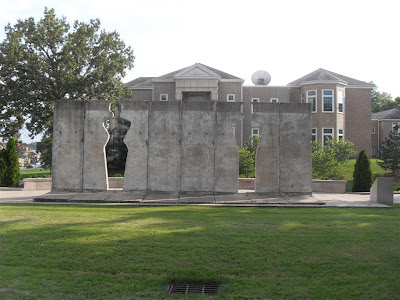"How could that be?" I wondered, "Everyone could see it was evil, why couldn't the people who actually live there? Why would it take an American President to make them stop and question something that was so obviously not working for participants and outsiders alike?"
Reagan said:
...I urge you to beware the temptation of pride, the temptation of blithely declaring yourselves above it all and label both sides equally at fault, to ignore the facts of history and the aggressive impulses of an evil empire, to simply call the arms race a giant misunderstanding and thereby remove yourself from the struggle between right and wrong and good and evil.President Bush tried to create the same effect of waking foreign citizens out of their denial by demanding Iran, Iraq, and North Korea end their "axis of evil." Unfortunately, President Bush seemed to be in his own self-delusion regarding weapons of mass destruction in Iraq at the time so it didn't quite have the intended effect. And it also didn't accurately reflect those three nations diplomatic actions. They weren't in a tri-part pact.
If people get delusional, it makes sense that countries and societies can get delusional too. They are just a giant collection of individual people. Indeed, there are delightful books written about economic self-delusion such as Tulipmania: The Story of the World's Most Coveted Flower & the Extraordinary Passions It Aroused. Another well-known form of personal delusion is addiction as described in the fiction bestseller A Million Little Pieces.
What could some national delusions be? How about:
Colonization?
Debt loads?
Empire?
Ethnic cleansing (World War II Germany and the Balkans and Rwanda more recently)?
Environmental degradation?
Hatred? (Middle Eastern attitudes toward Jewish People and European attitudes toward Roma)?
Extreme Paranoia and Societal Militarization (North Korea)?
Extreme Paranoia and Thugocracy? (Iran)
Nationalization of Property? (Soviet Union)
Non-Acceptance of Election Results? (Ivory Coast)
Extraordinary Corruption? (Afghanistan)
Extraordinary Use of Resources (United Arab Emirates and the United States)
Censorship and Lack of Free Expression (China)
What if someone with more credibility and less baggage than President Bush, a disinterested organization with a track record of caring, credibility, and leadership toward uplifting humanity gave the national equivalent of a 12-step intervention to a nation? A diplomatic call to "snap out of it!"
I propose that such a yearly intervention exist. Coming from the Nobel Committee, this yearly-awarded challenge could go to the country most needing a loving intervention and reminder that your fellow humans wish the best for you and think you can and should do better.
In order to let a nation know it needs to change, this intervention could be labeled not the Nobel Prize, but the Nobel Challenge. The Nobel Challenge would be the very classy national equivalent of friends and family sending an addict to rehab. Detox, please!
Even if countries go behind "an iron curtain," if the citizens have known about the prize beforehand and find out that their country has won the award, it becomes a kind of shorthand meaning "look long and hard at the direction your nation is headed. We, orignators of the award, "challenge" you because we think your nation is the one potentially endangering the peace of the world. It forces debate among citizens that can't be so easily dismissed and ignored.
The Nobel Challenge could be the sort of thing that seeps change into a country at the grassroots level. How can any one story in the media reach the North Korean people and give them the message "the entire world thinks you need a change." For all I know, the North Korean people know that better than we do. But do all the people of Iran? What seeps into the minds of the oppressed at the grass roots level? One big call to action might not only bring people to discuss change, but be empowered to create change.
Here's another example from my own culture where a society fails to recognize its own delusion. There were recently stories in the news that America and the United Arab Emirates consume electricity and water in huge quantities. The United Arab Emirates used four times as much water as Europe and four times as much electricity as the United States. These stories may have been noted for about 24 hours when they came out but most citizens of those countries would just yawn in indifference.What if the world, in the form of the Nobel Committee, said through the Nobel Challenge, "your use of resources is unsustainable, please change, your behaviour could create potential conflicts." First, my country would have a hissy fit, then we would get down to business and exceed whatever benchmark was given for change.
So how can humanity create change rather than yawning indifference to a long-term story? Think instead how the announcement of a Nobel Prize is treated. The tradition is institutionalized so journalists are prepared for the announcement and make sure to cover it in a significant way. It's a tradition that is highly anticipated around the world. It has a track record that people can discuss and debate. It has a meaning deeper than one particular year or person or organization. Instantly, when a Nobel Prize is announced, book clubs around the world read the works written by the author cited in the literature prize, for example, and think about the author's ideas and discuss what has been held up to the light by the prize.
Why even a totalitarian nation might have a hard time keeping that news from it's people no matter how hard it tried. It would be the equivalent of when an addict is confronted by all their family and all of their coworkers and the ability to "excuse" is stripped away. I recognize that defiance (one of the central hallmarks of an addict), may be the outcome of a dictator being challenged in this way, but the world has to shut him down sometime.
In George Orwell's "Animal Farm," it's when the pigs take the milk and apples from the other animals and the other animals notice and don't say anything that the abuse of power continues and increases. Orwell calls it the turning point of the story. When Chamberlain appeased Hitler with Czechoslovakia, same thing. Indeed, an ignored Nobel Challenge to someone like Saddam for the way he treated his citizens might have given George Bush some legitimacy for later intervention (I can't believe I just said that, I didn't believe in that military intervention one whit).
As the history of the Nobel Challenge built up, it might begin to have a preemptive performance effect before it is even given. Jack Welch, the CEO of GE chosen by Fortune Magazine as the "Manager of the Century", was famous for the performance he got out of his company (when he took over as CEO, revenues were $26.8 billion - when he left they were $130 billion). He had a rule that he would eliminate the bottom 10% of nonperforming staff every year. Can you imagine how extremely motivating it must have been to people to not be in that bottom 10%? Can you imagine how motivating it would be to not have your country ever receive a Nobel Challenge? It sounds cruel, but actual conflicts are crueler. Just read my previous blog post for a reminder.
All managers of any sort of human enterprise know that there is an entire emotional cycle to implementing change with all kinds of foot-dragging and noise by those who hate changing. The Nobel Challenge could be helpful in prodding those who love the status quo because it's the "devil they know." The world may have to absorb change at an even faster pace in the future.
If our species doesn't find a way to challenge the ever-expanding global abuses of power in a cost-effective, non-military way, could it be the turning point in our story?










































 Who links to me?
Who links to me?
